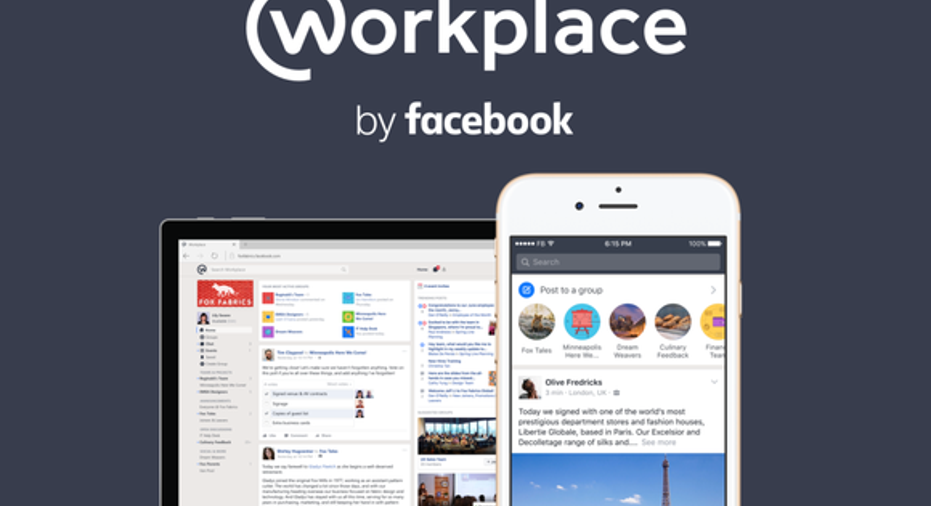Facebook Wants to Take Down Slack

Image source: Facebook.
This was bound to happen. Hot enterprise messaging start-up Slack has attracted plenty of attention due to its meteoric rise in popularity, which has mostly been attributed to word-of-mouth advertising -- the best kind of marketing. As enterprise users have been flocking to the service over the past two years, rivals have taken note and want to jump in or improve their defense.
Microsoft (NASDAQ: MSFT) reportedly even considered buying Slack for an unreasonable $8 billion. It's a good thing that CEO Satya Nadella put an end to that idea about as quickly as it was introduced. Instead, Microsoft is looking to replicate Slack under its Skype umbrella, even as Microsoft has several other enterprise messaging offerings. Well, now Facebook (NASDAQ: FB) wants in.
Time for a name change
The social network has just launched Workplace, which is a simplified rebranding of Facebook at Work, the professional version of the social network that Facebook has been developing and testing out for a couple of years. Facebook says that over 1,000 companies have started using Workplace across the world, and today's launch represents a broader rollout of the service to any company that wants to use it. Naturally, there is a big emphasis on mobile, as mobile connectivity continues to change how and where people can be productive.
All of the standard features from the consumer-oriented Facebook like News Feed, Groups, chats, reactions, live-streaming, and search are all available. Workplace will also include enterprise-oriented features such as analytics and single sign-on integrations with enterprise identity companies. The goal will be to make it as easy as possible for a customer's IT systems to integrate with Workplace. Another new feature is Multi-Company Groups, which allow employees at different companies to work together and collaborate on projects.
But at what cost?
As far as pricing goes, Workplace will be free for non-profits and educational institutions, but everyone else will pay per monthly active user (after a three-month free trial). Facebook is making the service economically scalable with volume pricing. All features are standard, so pricing only varies based upon how many users there are.
Data source: Facebook.
There are also no long-term contracts, so companies can ditch Workplace at any time if they don't like it.
Should Slack be scared?
Those price points significantly undercut Slack, and Workplace is a clear competitor that wants to provide a company's collaboration and communications needs. The structure of the platform will be familiar to most people, since Workplace's interface is just like Facebook's, and differ from Slack's channel-based structure.
Slack charges based on various tiers with different feature sets, and encourages long-term contracts by offering discounts.
Source: Slack.
Slack is also working on an enterprise offering that targets larger organizations as it expands beyond its historical customer base of small and medium-sized businesses. As of May, Slack said it had 930,000 paid seats, which is up from 40,000 about two years ago. The company reportedly generated $64 million in revenue last year.
Facebook has a real shot of dampening Slack's growth, thanks to a aggressive pricing and a comprehensive feature set.
Why Facebook investors should be excited
Workplace is also an exciting monetization opportunity for Facebook. The company is essentially taking the core product that it has always had, adding enterprise features like security, and then offering the service as a paid product. That should translate into efficient R&D spending relative to potential financial upside.
This is especially true if Workplace is adopted in regions where Facebook's ad monetization is poor, such as Asia-Pacific or its rest of world segment.
Data source: Facebook. ARPU = average revenue per user.
Even at the lowest tier of $1 per month for a large company, Facebook could dramatically improve monetization in certain regions. Keep in mind that the ARPU figures above are quarterly, so collecting $3 to $9 per quarter is potentially huge if Facebook gets enough companies to sign on.
A secret billion-dollar stock opportunity The world's biggest tech company forgot to show you something, but a few Wall Street analysts and the Fool didn't miss a beat: There's a small company that's powering their brand-new gadgets and the coming revolution in technology. And we think its stock price has nearly unlimited room to run for early in-the-know investors! To be one of them, just click here.
Evan Niu, CFA owns shares of Facebook. The Motley Fool owns shares of and recommends Facebook. The Motley Fool owns shares of Microsoft. Try any of our Foolish newsletter services free for 30 days. We Fools may not all hold the same opinions, but we all believe that considering a diverse range of insights makes us better investors. The Motley Fool has a disclosure policy.



















